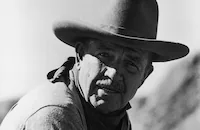Lost in Alaska
Cast & Crew
Jean Yarbrough
Bud Abbott
Lou Costello
Mitzi Green
Tom Ewell
Bruce Cabot
Film Details
Technical Specs

Synopsis
In San Francisco during the Gold Rush era, volunteer firemen Tom Watson and George Bell rescue "Nugget Joe" McDermott as he tries to drown himself in the bay. Joe, however, does not want to be rescued, as he is pining for his lost Alaskan love, singer Rosette. Tom and George, upon discovering that Joe has two million dollars worth of gold, desperately work to save the suicidal miner as the night wears on. In the morning, Joe receives a note from Rosette asking him to return to her in Alaska, and in his joyful relief that he is still alive, gives several bags of gold to Tom and George. The day after the friends pay their landlady with the gold, however, they learn that they are suspected of robbing and drowning Joe. They find the still-living Joe on a boat that is about to leave for Alaska, and, when the lovestruck miner refuses to disembark in order to clear their names, accompany him to his hometown of Skagway. There, almost everyone in town is out to kill Joe for his money, including the old-timer friends whom Joe has named in his will and all the sons of the men he has hanged in the past. Tom and George do everything they can to guard Joe, knowing that if he dies, he will not be able to clear their names. In Jake Stillman's saloon, Joe finds Rosette, who informs him that she did not send for him. Although Stillman protects Joe from the locals, he later reveals to Rosette a scheme he has concocted, whereby she will marry Joe and be named his heir, then he will kill the miner and share the inheritance. Rosette pretends to agree but warns Joe of Stillman's plan, while insisting that she still does not love him. Joe sends Tom and George to find lawyer Bob Higgins to help change Joe's will, but Higgins is promptly abducted and Joe realizes that his only chance is to move his gold so no one will be able to find it if they kill him. Rosette agrees to help him and they set out for the Eskimo village of Mackinack, leaving Tom and George to follow them. The two friends struggle to round up enough stray dogs to pull their sled, but when the dogs take off after a cat, they are left stranded in the tundra. There, they attempt ice-fishing but see only a seal, which George believes is a strange dog. They then freeze solid during a walk through a storm, but are rescued and thawed out by Mackinack Eskimos. In the village, they reunite with Joe and Rosette, and the four attend a ceremonial Eskimo dance, where they eat whale meat, which spouts at George. Upon waking the next day, Tom and George spy Stillman with two henchmen, and hold them at bay while Joe and Rosette load the gold onto a sled and cross the hill. Before they can get away, however, the old-timers appear menacingly on the other side of the hill, and the gold-laden sled slides down onto thin ice. As the sled sinks, Joe moans that he has lost everything, but Rosette admits that she loves him. Stillman, no longer under the spell of the awe-inspiring gold, insists on throwing their wedding.

Director

Jean Yarbrough
Cast

Bud Abbott

Lou Costello

Mitzi Green

Tom Ewell

Bruce Cabot
Emory Parnell
Jack Ingram
Rex Lease
Joseph Kirk
Minerva Urecal
Howard Negley
Harry Tyler
William Gould
Maudie Prickett
Paul Newlan
Michael Ross
Julia Montoya
Iron Eyes Cody
Sherry Moreland
Jean Hartelle
Benn Classetti
Bert Lebaron
Fred Aldrich
Eddie Randolph
Billy Wayne
Jack Gordon
Donald Kerr
Carl Sklover
Bobby Barber
George Barton
Charles Sullivan
Monte Montague
Charles Sherlock
Crew
Gene Anderson
Harold Belfer
Robert Boyle
Milt Bronson
Leslie I. Carey
Howard Christie
Russell A. Gausman
Joseph Gershenson
Frederick Herbert
Bernard Herzbrun
Arnold Hughes
Ray Jeffers
Kara
Joe Kenny
Harold Lewis
Martin A. Ragaway
George Robinson
Joan St. Oegger
Leonard Stern
Elwood Ullman
Leonard Weiner
James Welch
Bud Westmore

Film Details
Technical Specs

Quotes
Trivia
Notes
The working titles of this film were The Sourdoughs and Abbott and Costello Lost in Alaska. A November 12, 1951 Hollywood Reporter news item announced that the film was originally to co-star Denise Darcel and be directed by Charles Lamont. Mitzi Green, who played "Rosette," was a former child actress who had not appeared in a feature film since the 1934 picture Transatlantic Merry-Go-Round (see AFI Catalog of Feature Films, 1931-40).












